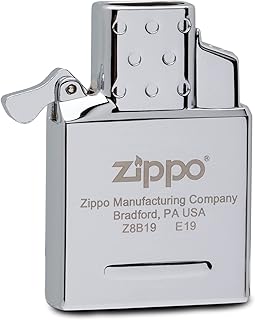The Anatomy of a Zippo Lighter: Understanding Its Parts and Functionality
The iconic Zippo lighter, known for its distinctive click and enduring flame, is a marvel of simple yet effective design. Here's a breakdown of its essential components:
1. The Case:
* Material: Typically made of durable brass, though variations exist in other metals like chrome, silver, and even limited edition materials.
* Construction: The case is comprised of two halves, seamlessly joined by a hinge, which allows for smooth opening and closing.
* Design: The iconic rectangular shape with rounded edges and a distinctive "Zippo" logo imprinted on the case.
2. The Inner Mechanism:
* Wicking: A fibrous material, usually cotton, that draws fuel from the reservoir to the flame.
* Flint Wheel: A serrated wheel that sparks when struck by the striker.
* Striker: A small metal rod with a spring attached, which strikes the flint wheel upon the lighter's opening.
* Fuel Reservoir: Contains lighter fluid, typically a naphtha-based liquid, that provides the fuel for the flame.
* Flame Adjuster: A small lever at the base of the lighter that controls the size of the flame.
* Windshield: A metal shield that protects the flame from wind.
3. How it Works:
* Fueling: The Zippo lighter is refillable with lighter fluid, which is poured directly into the fuel reservoir.
* Ignition: When the lighter is opened, the striker strikes the flint wheel, creating sparks. These sparks ignite the fuel-soaked wick, producing a flame.
* Flame Adjustment: The flame adjuster lever controls the flow of fuel to the wick, allowing for different flame sizes.
4. Key Features:
* Durable: The robust construction and simple design make Zippo lighters highly durable and long-lasting.
* Refillable: The ability to refill with lighter fluid makes the Zippo a reusable and cost-effective choice.
* Windproof: The windshield effectively protects the flame from wind, ensuring a reliable flame even in harsh conditions.
* Iconic: The distinctive design and click have made the Zippo lighter a cultural icon and a symbol of both utility and style.
5. Maintenance:
* Refilling: Regularly refill the lighter with lighter fluid when the flame starts to diminish.
* Flint Replacement: Replace the flint when it becomes worn out, as indicated by a diminished spark.
* Wicking Replacement: Replace the wick periodically, especially if it becomes frayed or saturated.
* Cleaning: Clean the lighter with a soft cloth to remove dirt and debris.
In conclusion, the Zippo lighter is a testament to ingenious design and functionality. Its simplicity, durability, and iconic status have made it a beloved and enduring symbol of both practicality and cultural relevance.


